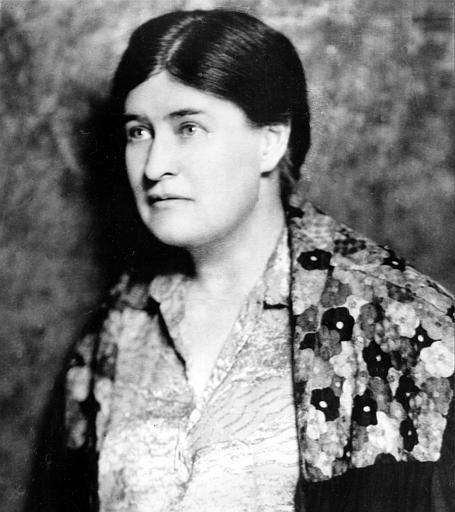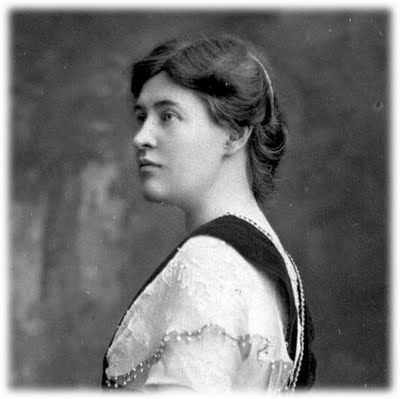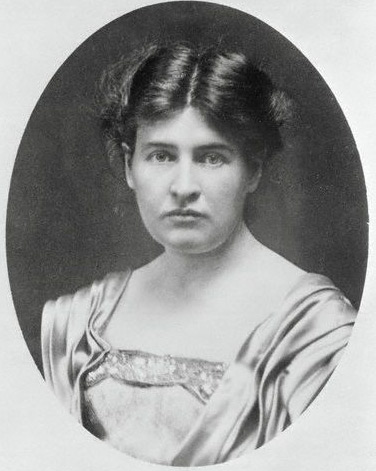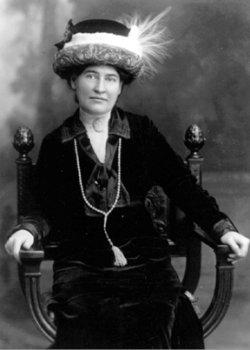<Back to Index>
- Astronomer Abd al-Rahman al-Sufi, 903
- Writer Willa Seibert Cather, 1873
- President of the Swiss Federal Council Felix Louis Calonder, 1863
PAGE SPONSOR
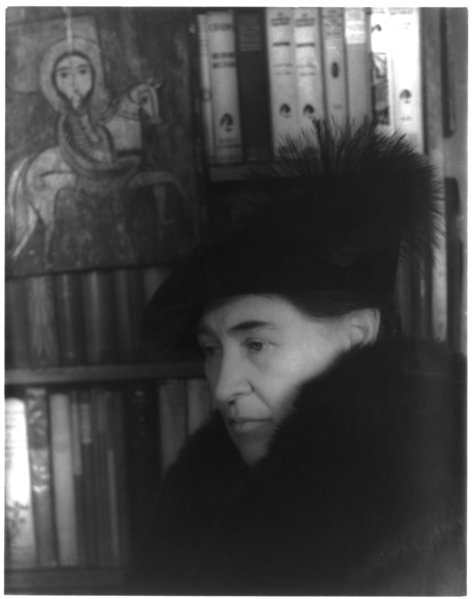
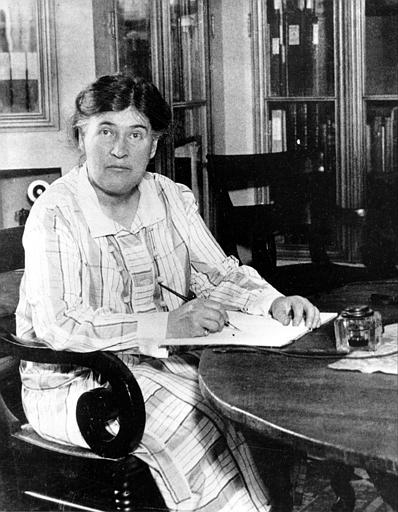
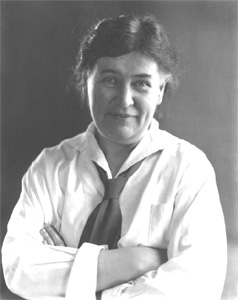
Willa Seibert Cather (December 7, 1873 – April 24, 1947) was an American author who achieved recognition for her novels of frontier life on the Great Plains, in works such as O Pioneers!, My Ántonia, and The Song of the Lark. In 1923 she was awarded the Pulitzer Prize for One of Ours (1922), a novel set during World War I. Cather grew up in Nebraska and graduated from the University of Nebraska; she lived and worked in Pittsburgh for ten years; at age 33 she moved to New York for the rest of her adult life and writing career.
She was born Wilella Seibert Cather in 1873 on her maternal grandmother's farm in the Back Creek Valley near Winchester, Virginia. Her father was Charles Fectigue Cather (d. 1928), whose family had lived on land in the valley for six generations. Her mother was Mary Virginia Boak (d. 1931), a former school teacher. Within a year of Cather's birth, the family moved to Willow Shade, a Greek Revival style home on 130 acres given to them by her paternal grandparents.
The Cathers moved to Nebraska in 1883, joining Charles' parents, when Willa was nine years old. Her father tried his hand at farming for eighteen months; then he moved the family into the town of Red Cloud, where he opened a real estate and insurance business, and the children attended school for the first time. Cather's time in the western state, still on the frontier, was a deeply formative experience for her. She was intensely moved by the dramatic environment and weather, and the various cultures of the European - American, immigrant and Native American families in the area. Her town was named for the renowned Oglala Lakota chief.
Mary Cather had six more children after Willa: Roscoe, Douglass, Jessica, James, John, and Elsie. Cather was closest to her brothers, less close to her sisters whom, according to her biographer Hermione Lee, Cather "seems not to have liked very much."
Cather had planned to major in science at the University of Nebraska — she hoped to become a medical doctor. After her essay on Thomas Carlyle was published in the Nebraska State Journal during her freshman year, she became a regular contributor to the Journal, changed her major, and graduated in 1894 with a B.A. in English.
In 1896, Cather moved to Pittsburgh after being hired to write for the Home Monthly, a women's magazine patterned after the successful Ladies Home Journal. A year later, she became a telegraph editor and drama critic for the Pittsburgh Leader and frequently contributed poetry and short fiction to The Library, another local publication. In Pittsburgh, she taught Latin, algebra, and English composition at Central High School for one year. She next taught English and Latin at Allegheny High School, where she became the head of the English department.
In 1906 Cather moved to New York City upon receiving a job offer on the editorial staff from McClure's Magazine. During her first year at McClure's, she wrote a critical biography of Christian Science founder, Mary Baker Eddy. While Georgina Milmine's name appears as co-author both in serial and book form — she provided copious amounts of research but was incapable of producing a publishable manuscript — Cather was the principal writer of the biography. Mary Baker Eddy: The Story of Her Life and the History of Christian Science was published in McClure's in fourteen installments over the next eighteen months and later in book form.
McClure's serialized Cather's first novel, Alexander's Bridge (1912). Most reviews were favorable. The New York Times praised "the dramatic situations and the clever conversations," and the Atlantic called the writing "deft and skillful."
Cather followed Alexander's Bridge with her Prairie Trilogy —O Pioneers! (1913), The Song of the Lark (1915), and My Antonia (1918). These deeply felt works became both popular and critical successes. Cather was celebrated by national critics such as H.L. Mencken for writing in plainspoken language about ordinary people. Sinclair Lewis praised her work for making "the outside world know Nebraska as no one else has done."
Through the 1910s and 1920s, Cather was firmly established as a major American writer, receiving the Pulitzer Prize in 1922 for her novel One of Ours. By the 1930s, critics began to dismiss her as a "romantic, nostalgic writer who could not cope with the present." Critics such as Granville Hicks charged Cather with failing to confront "contemporary life as it is" and escaping into an idealized past. During the suffering of the Dust Bowl and the Great Depression, her work was seen to lack social relevance. Discouraged
by the negative criticism of her work, Cather became reclusive. She
burned letters and forbade anyone from publishing her letters.
As a student at the University of Nebraska in the early 1890s, Cather sometimes used the masculine nickname "William" and wore masculine clothing. A photograph in the University of Nebraska archives depicts Cather dressed like a young man and with "her hair shingled, at a time when females wore their hair fashionably long."
Throughout Cather's adult life, her most significant friendships were with women. These included her college friend Louise Pound; the Pittsburgh socialite Isabelle McClung, with whom Cather traveled to Europe; opera singer Olive Fremstad; pianist Yaltah Menuhin; and most notably, the editor Edith Lewis, with whom Cather lived the last 39 years of her life. Cather's sexual identity remains a point of contention among scholars. While many argue for Cather as a lesbian and interpret her work through a lens of queer theory, a highly vocal contingent of Cather scholars adamantly oppose such considerations.
The scholar Janet Sharistanian has written, "Cather did not label herself a lesbian nor would she wish us to do so, and we do not know whether her relationships with women were sexual. In any case, it is anachronistic to assume that if Cather's historical context had been different, she would have chosen to write overtly about homoerotic love."
Cather's relationship with Edith Lewis began in the early 1900s. The two women lived together in a series of apartments in New York City from 1908 until the writer's death in 1947. From 1913 to 1927, Cather and Lewis lived at No. 5 Bank Street in Greenwich Village. They moved when the apartment was scheduled for demolition during construction of the Seventh Avenue subway line. Cather selected Lewis as the literary trustee for her estate.
Born into a Baptist family, in 1922 Cather joined the Episcopal Church. She had been attending local Episcopal services since her first year in New York in 1906.
Beginning in 1922, Cather spent summers on Grand Manan Island, in New Brunswick, Canada. She bought a cottage in Whale Cove, on the Bay of Fundy. It was the only house she ever owned.
Cather died on April 24, 1947 in New York City of a cerebral hemorrhage and was buried in the Old Burying Ground, Jaffrey Church, in Jaffrey, New Hampshire.
A
resolutely private person, Cather had destroyed many old drafts,
personal papers, and letters. Her will restricted the ability of
scholars to quote from those personal papers that remain. Since the
1980s, feminist and other academic writers have explored Cather's sexual
orientation and the influence of her female friendships on her work.
Cather admired Henry James as a "mighty master of language and keen student of human actions and motives." She generally preferred past literary masters to contemporary writers. Some particular favorites were Dickens, Thackeray, Emerson, Hawthorne, Balzac, Flaubert, and Tolstoy.
While Cather enjoyed the novels of George Eliot, the Brontës, and Jane Austen, she regarded most women writers with disdain, judging them overly sentimental and mawkish. Cather's
biographer James Woodress notes that Cather "so completely ... embraced
masculine values that when she wrote about women writers, she sounded
like a patronizing man." One contemporary exception was Sarah Orne Jewett,
who became Cather's friend and mentor. Jewett advised Cather to use
female narrators in her fiction, but Cather preferred to write from a
male point of view. Jewett also encouraged Cather to write about subjects that had "teased the mind" for years. Chief among these subjects were the people and experiences Cather remembered from her years in Nebraska. She dedicated O Pioneers!, the first novel in her Prairie Trilogy, to Jewett.
- 1955, The Willa Cather Pioneer Memorial and Educational Foundation (now the Willa Cather Foundation) was founded to support the study of her life and work, and to maintain many sites in her hometown of Red Cloud, Nebraska.
- 1956 – A library branch location was opened in Willa Cather's name. Part of the Omaha Public Library system and is located on the corner of 44th and Center in Omaha, Nebraska.
- 1962, Cather was elected to the Nebraska Hall of Fame.
- 1973, the United States Postal Service honored Willa Cather by issuing a stamp with her image.
- 1981, the U.S. Mint created the Willa Cather half-ounce gold medallion.
- 1986, Cather was inducted into the National Cowgirl Museum and Hall of Fame.
- A residence hall at the University of Nebraska – Lincoln is named after Cather.
